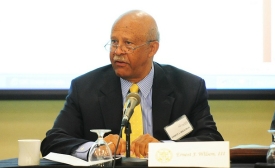Americas

The USC Center on Public Diplomacy was proud to host Ernest J. Wilson III, Dean of the USC Annenberg School for Communication, for a presentation on "Rebooting America's Image in the World." Dean Wilson recently returned from Washington, D.C. where he served on the Presidential Transition Team for President-Elect Barack Obama.
Newly minted President Obama offered an address this morning that can be viewed on many layers. An inaugural address is primarily a message to Americans and secondarily a message to the governments and peoples of the world. But in 2009, more than in most years, this address is a message from Americans to a global village about what America is, what America seeks to be, and how America intends to work with that global village.
Quincy Jones's welcome appeal for the creation of an American cultural tsar has fascinating implications for the world of public diplomacy. Jones himself has been a figure in American cultural diplomacy from his early days as the manager for the Dizzy Gillespie band tours of the Middle East and Latin America in the late 1950s to his own work as a powerful international voice of American cultural creativity.

The New America Foundation/American Strategy Program hosts:
"Diplomacy, Power & America's Purpose In a Changing World"
THE HONORABLE ZALMAY KHALILZAD
United States Ambassador to the United Nations
Former US Ambassador to both Afghanistan and Iraq
with
STEVE CLEMONS
Director, American Strategy Program, New America Foundation
Streaming live on http://www.TheWashingtonNote.com/
WEDNESDAY, 14 JANUARY 2009
12:15 pm – 1:45 pm (EST)

A Symposium on the Smith-Mundt Act of 1948
January 13, 2009
Today’s press conference by President Bush was his last and — by all appearances — his most unscripted. Here was the 43rd President at turns dismissive, angry, jocular, self-deprecating and defensive in describing his eight years in office. What stood out, however, in relation to America’s image, was Bush’s rambling, disputatious monologue when asked about America’s "moral standing:"







